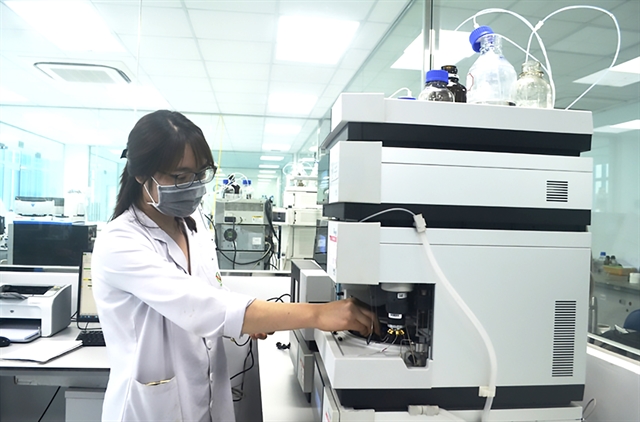 Opinion
Opinion

Director of the Department of Technology Application and Development Tạ Việt Dũng spoke to Quân đội Nhân dân (People's Army) online newspaper about the policies to support businesses to innovate

|
| A technician at the Institute of Functional Foods (at Hoà Lạc Hi-Tech Park, Hà Nội) operates modern machinery and equipment. — Photo qdnd.vn |
Director of the Department of Technology Application and Development Tạ Việt Dũng of the Ministry of Science and Technology speaks to Quân đội Nhân dân (People's Army) newspaper about recent policies to support businesses to innovate.
Could you talk about the programmes Việt Nam has recently implemented to encourage businesses to innovate?
The Ministry of Science and Technology is restructuring science and technology programmes and tasks to encourage innovation in enterprises, such as a programme on searching and transferring foreign technologies, the National Technology Innovation Programme, and the National Product Development Programme.
In addition, strengthening support for businesses through the National Fund for Technology Innovation and the National Fund for Science and Technology Development to put tasks associated with social needs and the value chain of products, helping to support and create favourable conditions for enterprises to expand capital sources for technology application, development and innovation.
The Department of Technology Application and Development has consulted leaders of the Ministry of Science and Technology on several laws and decisions related to science and technology to create a favourable legal environment, support and promote businesses, institutes and science and technology organisations to apply, develop and innovate technology.
The department has also directly implemented activities and tasks, such as managing and implementing the National Technology Innovation Program; organising the management, guidance and implementation of activities connecting technology supply and demand across the country; organising activities relating to technical consultancy and support and technology innovation for enterprises.
How effective were the programmes to support innovation for businesses in the past?
During 2011-20, enterprises achieved many encouraging results through the National Technology Innovation Programme. Hundreds of technologies and processes have been absorbed and mastered, and dozens of patents have been obtained.
Average labour productivity of enterprises sharply increased after technology innovation (some businesses recorded a five-fold increase in labour productivity). Their products have met the demand of the domestic market and the strict requirements of foreign markets. Revenue of these enterprises increased more than two times, and profits increased about 2.4 times compared to the period before technology innovation.
With the achieved results, the National Technology Innovation Program continued to be approved by the Prime Minister until 2030.
Regarding technology supply and demand connection activities, during 2011-20, 13 events were held to connect technology supply and demand at international, national and regional scales.
Every year, about 3,000 processes, technologies, equipment and products of nearly 700 domestic and international institutes, universities, enterprises, science and technology organisations and amateur inventors were selected to perform and be introduced at the events.
We have also developed technology manuals, including 2,500 processes, technologies, equipment and products of organisations and individuals, and supported to connect 142 cooperation and technology transfer contracts between organisations and enterprises. The rate of contracts and cooperation agreements implemented after signing reached 41.5 per cent.
What are the difficulties in State management of innovation?
Currently, innovation activities and the implementation of policies and support for innovation are still scattered with the participation of different parties, sometimes without coordination, leading to the possibility of overlapping and waste of resources.
The Ministry of Science and Technology does not have enough authorisation to deal with some issues relating to policies about science and technology. Many policies to support innovation require interdisciplinary decisions that no single sector has the authority to deal with.
The mechanism for implementing the "sandbox" testing policy (creating a favourable space with its own legal policy framework outside or beyond the current legal framework to conduct testing of innovative startups) has yet to be widely accepted.
The building and implementation of policies lack consultancy from the private sector to design innovation policies more realistically.
What solutions do you suggest to strengthen State management of innovation in the future?
To improve the efficiency of State management over innovation, it is necessary to develop and issue mechanisms and regulations for coordination between the Ministry of Science and Technology with relevant ministries, agencies and localities to create unity, efficiency and continuity in State management of innovation.
It is also essential to complete the legal corridor about State management over innovation, promoting the development and improving the operational efficiency of the national innovation system, regional and sectoral innovation systems, and the innovative start-up ecosystem in line with conditions of Việt Nam, in which enterprises play the central role of the innovation system and research institutes and universities conduct research.
We must also focus on building specific and outstanding mechanisms and policies to promote technology application and transfer; and implementing a new and superior policy testing mechanism to promote the deployment and application of new technologies, innovation, and new technology-based business models. — VNS




